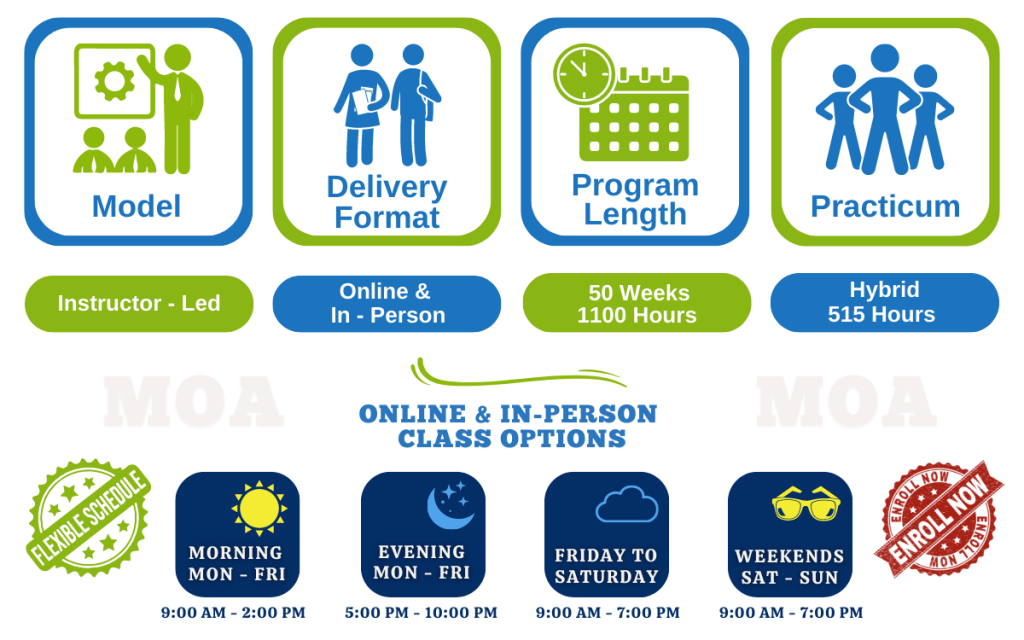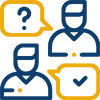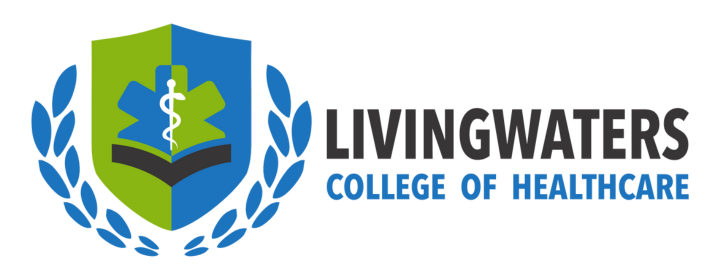Enroll Now
Medical Office Administration Program
Do you perform well in a fast-paced office setting? Have you ever imagined yourself assisting someone in need? If so, take into account a career as a medical office administrator. You can become a crucial member of a healthcare team and have a steady, well-paying profession in less than a year while simultaneously significantly improving the lives of others. This could be the ideal career for you to shine in if you’re a dedicated, organised, and compassionate individual who is also caring and compassionate.
Enroll in Livingwaters College’s Medical Office Administration Program to develop the skills necessary to flourish in a professional medical setting. You’ll be prepared to start a number of rewarding healthcare occupations in both medical offices and hospitals with the integrated Ward Clerk Specialist training.

About The Program

What You Will Learn In The Classroom:
In order to fully prepare students for employment in medical offices, hospitals, and other medical establishments, Livingwaters College’s Medical Office Administrator Program combines the technical abilities required to provide effective office administration and support with specialised medical knowledge. You will be taught how to deal with patients, answer the phone, and carry out other secretarial tasks in just 50 weeks.
You can have a secure, lucrative job in a burgeoning field as a medical office administrator while simultaneously significantly influencing people’s lives as a key player on a healthcare team. This could be the ideal career for you to shine in if you’re a dedicated, organised, and compassionate individual who is also caring and compassionate.
Modules covered in-class include:
- Medical Office Administration Fundamentals
- The Psychology of Healthcare
- Communicating for Health
- Interpersonal Skills and Human Behaviour
- Financial Accounting Principles
- Pharmacology
- Technology for Success (Part 1) – Keyboarding
- Technology for Success (Part 2) – Microsoft Office 2019 and 365
- Patient Registration and Scheduling Appointments
- Professional Fees, Billing and Coding
- Health Information Management
- Medical Terminology
- Medical Transcription Fundamentals
- Medical Office Administration in a Hospital Setting
- Medical Office Simulation Exercises
- Practicum Placement
- Review and Final Exam
Is a Rewarding Career as a Medical Office Administrator Program Right for You?
What You Will Learn In The Labs
In a Medical Administrator Program, lab work typically involves practical exercises that reinforce the theoretical concepts learned in lectures and textbooks. The labs may cover a wide range of topics related to the healthcare industry, including:
- Medical Terminology
- Health Information Management
- Medical Billing and Coding
- Office Procedures
- Transcription
- Medical Ethics
In the labs, students may also have the opportunity to work with other healthcare professionals, such as medical assistants, nurses, and physicians, to gain an understanding of their roles and responsibilities within the healthcare system. Overall, the labs in a Medical Administrator Program are designed to give students the practical skills and knowledge necessary to succeed in a healthcare administrative career.
What You Will Do During Career Search
Using manual or electronic tools, you can make appointments and greet patients. Also, give them the address of people or services that can provide general information over the phone and in person.
In addition, you can perform secretarial duties, keep track of front desk security access lists, accept payment for services, and interview patients to obtain data needed to provide medical and hospital services.
Courses
Here is a list of some courses:
- Medical Terminology: This module covers the basic medical terminology used in the healthcare industry, including anatomy and physiology, common medical conditions, and treatments.
- Health Law and Ethics: This module covers the legal and ethical principles that apply to the healthcare industry, including patient privacy, consent, and confidentiality.
- Medical Office Procedures: This module covers the daily administrative tasks performed in a medical office, including scheduling appointments, managing medical records, and handling patient billing.
- Medical Transcription: This module covers the skills needed to transcribe medical dictation into written reports, including knowledge of medical terminology and the ability to use transcription software.
- Health Information Management: This module covers the management of patient health records, including electronic health records (EHRs), data entry, and data management.
- Medical Billing and Coding: This module covers the principles of medical billing and coding, including the use of medical codes, insurance billing, and reimbursement procedures.
- Health Administration and Management: This module covers the management of healthcare organizations, including leadership, human resources, finance, and healthcare policy.
Career Opportunities
Graduates of this degree can find employment in both the public and commercial sectors in hospitals, medical and dental offices, and other healthcare office settings. These are a few instances of roles that alumni have attained:
- Medical receptionist
- medical assistant
- Medical billing specialist
- Medical office administrator
- clinical support
- a medical transcriber

Admissions Process

Our mission as a child and youth care worker college is to impact people with acquired skills and knowledge. To raise seasoned, compassionate and qualified healthcare workers.
We can’t do this without you.
We have designed a four step admissions process that ensures we admit the right students with the potential to become great graduates that serve their communities with excellence.

Connect with Us
The first step is to connect with our admissions team, we are here for you! We know you have questions the good news is we have answers. All you have to do to get started is fill out a form, call, text, email or even yell if you are close enough and we will commence your academic journey!

Confidential Interview
Now let’s get a little serious. When we meet, we will review your academic and career goals, talk about your options and determine your eligibility.
The key for LWCH is that you possess the right Attitude and Aptitude to be successful as a student and more importantly an employed Graduate of LWCH. The interview and evaluations will help us determine your eligibility. Sounds exciting, doesn’t it?

Financial Assessment
Whether you have been fortunate enough to put money aside or you just can’t seem to imagine how you would pay for College, not to worry, we have a Team here to help. I know free would be preferred, but you know what they say, the best things in life are never free! During this appointment, we will determine your eligibility with one of our many different financial aid options.
Financial assistance may be available for those who qualify.

Enrollment Ready!
Last but certainly not the least, after all the meetings and deliberation, we did it!
You are excited, comfortable with your chosen field and it is now time to put pen to paper and enroll.
Your admissions representative will take you step by step through all the forms to ensure you are prepared for the journey ahead.
We look forward to welcoming you to the Livingwaters College of Healthcare family soon!
